初中单词拼写做题技巧归纳练习(可编辑修改word版)
【中考专项练习】最新中考英语用所给单词的适当形式填空和答案(精选版)(可编辑修改word版)
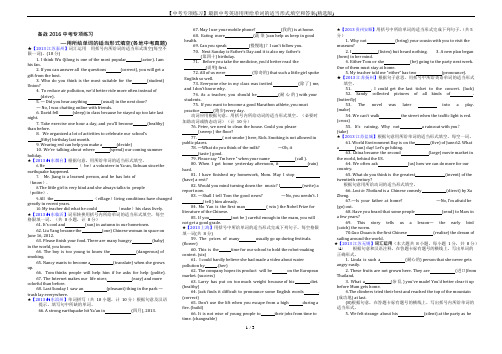
备战 2016 中考专项练习—用所给单词的适当形式填空(各地中考真题)★【2013 江苏泰州】词汇运用用括号内所给词的适当形式填空(每空不限一词)。
(10 分)1.I think Wu Qilong is one of the most popular (actor). I amhis fan.2.If you can answer all the questions (correct), you will get a gift from the host.3.Who do you think is the most suitable for the (student) Union?4.To reduce air pollution, we’d better ride more often instead of(drive).5.— Did you hear anything (usual) in the next door?— No, I was chatting online with friends.6.David fell (sleep) in class because he stayed up too late last night.7.Take exercise one hour a day, and you’ll become (healthy) than before.8.We organized a lot of activities to celebrate our school’s(fifty) birthday last month.9.Wearing red can help you make a (decide)10.We’re talking about where (spend) our coming summer holiday.★【2013 ft东烟台】根据句意,用所给单词的适当形式填空。
(完整word版)初中核心2000单词(自然拼读法分类)
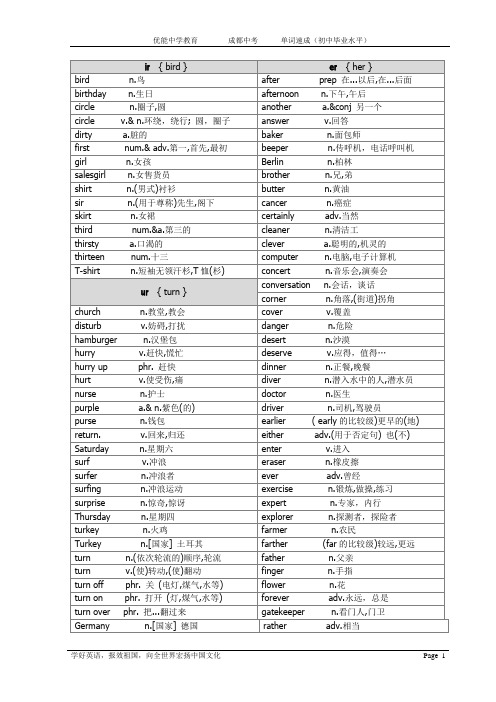
start
v.开始,着手
supermarket n.超级市场
yard
n.院子
学好英语,报效祖国,向全世界宏扬中国文化
amazing anything beginning boating boring bring crossing dumpling during evening everything exciting farming fishing go fishing living room meaning meeting missing morning moving nothing painting parking ping-pong rewarding ring ring up shopping sing spring stocking surfing thing training turning
Page 3
优能中学教育
成都中考
单词速成(初中毕业水平)
or ( oor )
afford v.有足够的(钱/时间)做(某事)
airport n.航空站,飞机场
be born phr. 出生于
before prep &adv.在..之前,以前
boring a.令人厌烦的
born
v. 出生 ( bear 的过去分词)
n.马
important a.重要的,重大的
more
adv.更,更加
morning
n.早晨,上午
nor
conj 也不
north
n.& v.北方(的),北部(的)
northeast n.东北,东北部
northern.
a.北部的,北方的
northwest
n.西北,西北部
(完整word版)人教版七年级上册英语单词默写(可直接打印)
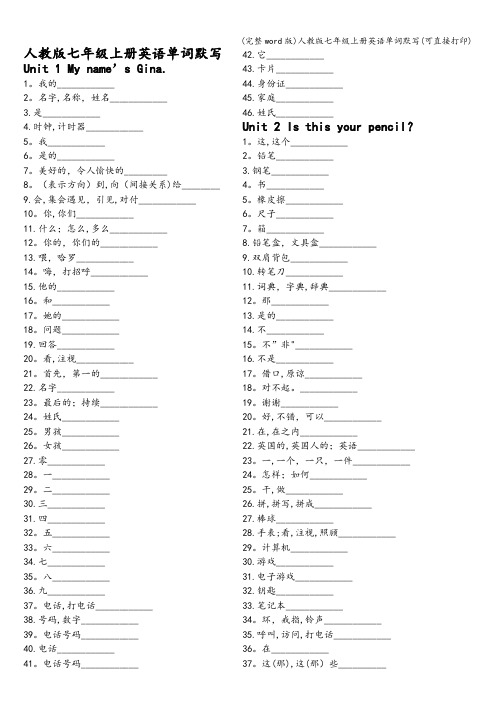
(完整word版)人教版七年级上册英语单词默写(可直接打印)人教版七年级上册英语单词默写Unit 1 My name’s Gina.1。
我的____________2。
名字,名称,姓名____________3.是____________4.时钟,计时器____________5。
我____________6。
是的____________7。
美好的,令人愉快的_________8。
(表示方向)到,向(间接关系)给________ 9.会,集会遇见,引见,对付____________10。
你,你们____________11.什么;怎么,多么____________12。
你的,你们的____________13.喂,哈罗____________14。
嗨,打招呼____________15.他的____________16。
和____________17。
她的____________18。
问题____________19.回答____________20。
看,注视____________21。
首先,第一的____________22.名字____________23。
最后的;持续____________24。
姓氏____________25。
男孩____________26。
女孩____________27.零____________28。
一____________29。
二____________30.三____________31.四____________32。
五____________33。
六____________34.七____________35。
八____________36.九____________37。
电话,打电话____________38.号码,数字____________39。
电话号码____________40.电话____________41。
电话号码____________42.它____________43.卡片____________44.身份证____________45.家庭____________46.姓氏____________Unit 2 Is this your pencil?1。
中考英语单词拼写解题技巧

中考英语单词拼写解题技巧题型概述在中考英语中单词拼写题是个难点,学生不容易掌握。
有时学生记单词记得挺熟练,但一旦用到句子中却得分率很低,这就说明学生还不会灵活运用。
为了让学生更好地掌握这类题目,我特意把单词按词性进行了分类,把近几年考的题目整理如下,并对词性的不同考点进行了说明。
希望同学们在做题中总结规律,找到技巧学会灵活应变。
一、单词拼写题的命题形式:单词拼写题常考题型主要有三种类型一)、根据句意填词在句子缺词的情况下,弄懂句子的意义是关键。
解答此类题时要注意“两个确定”,即“确定单词”和“确定形式”。
如:例1:The ________ day of the week is Sunday.例2:We should brush our ________ before going to bed.例3:March 8th is ________ Day.例4:Thank you very much for ______ me to your birthday party.例5:She didn't go to school yesterday ________ she was ill.二)、根据汉语注释填词根据下列句子及所给汉语注释,写出空缺处各单词的正确形式,每空一词。
例6:“Tom and Jim, do everything by ________ (自己)!”例7:When visitors ask you the way,you'd better tell them ________ (有礼貌地).例8:There is less water in the river. It is getting ________ (干).三)、首字母填空题例9:—When does the library open?—It opens at 8:00 on W________ and at 9:00 on Saturdays and Sundays.例10:The brother of one's father or mother means u________.例11:In autumn after a strong wind, the ground is often covered with fallen l____.例12:What were you doing when the bell rang at the b________ of the class.例13:Summer is the h________ season of the year.例14:The more c________ you do your exercises,the fewer mistakes you'll make.例15:The new boy had so many strange questions that his teacher did not u________ him.例16:It's too hot. Let's go s________ in the river.例17:We're finishing the second unit. Now let's go on with the t________ one.方法技巧方法一:通读全句,确定意思通读全句,根据前后内容判断该词意思,确保所填单词在逻辑意义上与整个句子一致。
外研版七年级上册英语单词默写(带音标)(中译英)(可编辑修改word版)
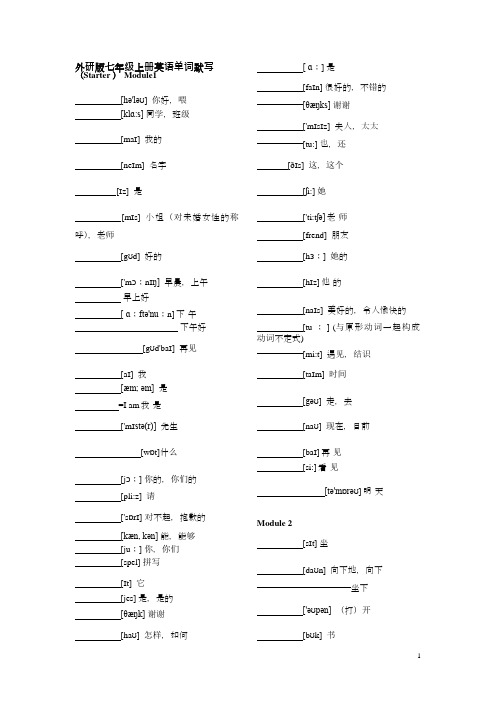
外研版七年级上册英语单词默写[ ɑː] 是(Starter )Module1[faɪn] 很好的,不错的[hə'ləʊ] 你好,喂[θæŋks] 谢谢[klɑ:s] 同学,班级['mɪsɪz] 夫人,太太[maɪ] 我的[tu:] 也,还[neɪm] 名字[ðɪs] 这,这个[ɪz] 是[ʃi:] 她[mɪs] 小姐(对未婚女性的称['ti:tʃə]老师呼),老师[frend] 朋友[gʊd] 好的[hɜː] 她的['mɔːnɪŋ] 早晨,上午[hɪz] 他的早上好[ ɑːftə'nuːn] 下午[naɪs] 美好的,令人愉快的下午好[tu ː] (与原形动词一起构成动词不定式)[gʊd'baɪ] 再见[mi:t] 遇见,结识[aɪ] 我[taɪm] 时间[æm; əm]是=I am 我是[gəʊ]走,去['mɪstə(r)]先生[naʊ] 现在,目前[wɒt]什么[baɪ] 再见[si:] 看见[jɔː] 你的,你们的[pli:z]请['sɒrɪ] 对不起,抱歉的[kæn, kən] 能,能够[juː] 你,你们[spel] 拼写[tə'mɒrəʊ] 明天Module 2[sɪt] 坐[daʊn] 向下地,向下[ɪt] 它坐下[jes] 是,是的[θæŋk] 谢谢['əʊpən](打)开[haʊ] 怎样,如何[bʊk] 书['lɪsn] 听,倾听[,θɜːti:n]十三[drɔ:] 绘画,画[,fɔ:'ti:n] 十四[pʊt] 放,置[,fɪfti:n] 十五[ʌp] 向上地,朝上,向上[,sɪks'ti:n] 十六[hænd] 手[,sevən'ti:n]十七[stænd] 站立[,eɪ'tiːn] 十八起立[kləʊs] 合上,关闭[,naɪn'ti ːn] 十九[nju ː] 新的['stju ːd(ə)nt] 学生['twentɪ] 二十[hɪə] 这里,在这里[bɔɪ] 男孩[ɪn] 在……里面[gɜːl] 女孩[desk] 桌子[wʌn] 一[tʃeə] 椅子[tu:] 二[θri:] 三[bæg] 包,书包[fɔ:] 四Module 3[faɪv] 五[ɪn] 使用(使用某种语言)[sɪks] 六['ɪŋglɪʃ] 英语,来自英格兰的['sevən] 七用英语[ə;eɪ] 一(个,件……)[eɪt] 八[raɪt] 写[ɒn] 在…..上[naɪn] 九[ðə; ði:](指已经谈到或正在谈的事)[ten] 十['blæk,bɔ ː d]黑板[,əʊ'keɪ] 行,好['telɪfəʊn] 电话[pen] 笔,钢笔[nəʊ] 不,不是,没有['nʌmbə] 号码['pens(ə)l; -sɪl] 铅笔[duː](用于构成疑问句和否定句)[əʊld] ……年龄的[bɜːd] 鸟多大,几岁[kæt] 猫[twelv] 十二[ dɒg] 狗['flaʊə] 花[ɪ'lev(ə)n] 十一[help] 帮助['lʌndən] 伦敦[miː](宾格)我['bɑːskɪt,bɔːl]篮球[ɒv; əv] …..的['fʊtbɔːl]足球[kɔ:s] 当然['swɪmɪŋ]游泳是的,当然['teɪbl,tenɪs] 乒乓球['klɑːsruːm] 教室[spɔːt] 运动[nəʊ] 知道,懂得[let] 让,使[seɪ] 说,讲[ʌs] (宾格)我们[ðæt] 那,那个= let us 让我们[ə'gen; ə'geɪn] 再(次),又(一次)[pleɪ] 参加,玩耍['welkəm] 受欢迎的,欢迎['ɑːftə] 在…….后不用谢,别客气[skuːl] 学校[blæk] 黑色的[aɪ'dɪə] 想法,主意[blu:] 蓝色的Module 1[gri ː n] 绿色的[,tʃaɪ'ni:z] n.中国人;adj.中国的['jeləʊ]黄色的[frɒm] prep 从……来,来自[red] 红色的[weə] adv 在哪里,去哪里[braʊn]棕色的[jɪə] n.年龄;年['ɒrɪn(d)ʒ] 橘黄色的,柑橘,[ə'baʊt] prep大约['kʌlə] 颜色怎么样[ænd] 和,与[mɪz]女士[ə'merɪkə]美国;美洲Module 4 [nɒt] 不,不是,没有[deɪ] 一天['ɪŋglənd]英格兰[tə'deɪ] 今天[haɪ] 嘿、喂['mʌndeɪ]星期一[ə'merɪkən] n.美国人adj.美国的['tjuːzdeɪ]星期二[aʊə] pron.我们的['wenzdeɪ]星期三[greɪd] n.年级['θɜːzdeɪ]星期四[hiː] pron.他['fraɪdeɪ]星期五['tʃaɪnə]中国['sætədeɪ]星期六['evrɪwʌn] pron. 大家;每人['sʌndeɪ]星期天['kæpɪt(ə)l] n.首都;省会['bɜːθdeɪ] 生日[bʌt;bət] conj.但是,然而['feɪv(ə)rɪt]最喜爱的['verɪ] adv.很;非常[sprɪŋ] 春天[bɪg] adj.大的['sʌmə] 夏天['sɪtɪ] n.城市['ɔːtəm]秋天[smɔ:l] adj.小的['wɪntə]冬天[wɔ:m] 暖和的,温暖的[fɜ:st] adj.第一(位)的,首要的名字[hɒt] 热的[lɑ: st] adj 最后的;最末的[kuːl]凉快的姓[kəʊld]冷的[ɔ:l] pron 每个;全体['weðə]天气[laɪk] 如同,像[nɜːs] n. 护士Module 2 [pə'li:smən] n.男警察[ ɑ:nt,] n. 姨母;伯母;婶母[wiː] pron.我们['brʌðə] n 兄弟[æn; ən] art.一个['kʌzən] n.堂兄弟;堂姐妹;[ dʒɒb] n.工作['dɔ:tə] n.女儿[æt; ət] prep.在……;在……里['fæmɪlɪ; -m(ə)l-] n.家,家庭[seɪm] adj. 相同的,同一的['fɑ:ðə] n.父亲爸爸['dɒktə] n. 医生['grænd,fɑ: ðə] n.(外)祖父[fɑ:m] n.农场['grænd,mʌðə] n.(外)祖母['wɜːkə] n.工人['grænd,peərənt] n(外)祖父母[mæn] n. 男人['mʌðə] n.母亲,妈妈[ʃɒp] n..商店['peərənt] n.母亲,父亲[ɪts] pron. 它的['sɪstə] n.姐;妹[ðeə] pron. 他们的,她们的,它们的[sʌn] n.儿子Module 3['ʌŋkl] n.叔叔;伯伯;舅舅;姑父;[kəm'pju:tə] n. 计算机;电脑['fəʊtəʊ] n.照片;相片['fɜːnɪtʃə] n.家具[ði:z] pron. 这些[mæp] n. 地图[ðeɪ] pron. 他们,她们吗,它们['pɪktʃə] n. 图片;相片[mʌm] n. 妈妈['telɪvɪʒ(ə)n] n.电视;电视机[left] n 左边左侧adj. 左边的;左侧的[wɔ:l] n.墙在左边,在左侧['θɜːtɪ] num三十[dæd] n 爸爸['fɔːtɪ] num四十[raɪt] n. 右边右侧adj. 右边的,右侧的['fɪftɪ] num五十在右边;在右侧['sɪkstɪ] num六十[huː] pron. 谁['sev(ə)ntɪ] num七十['wʊmən] (pl.['wɪmɪn])['eɪtɪ] num八十n. 成年女子;妇女['naɪntɪ] num[nekst] adj. 紧挨着,紧靠着adv 下一['rɪəlɪ] num九十步['menɪ] adj. 许多,很多在……旁边,紧挨着多少['hʌzbənd] n 丈夫[ðeə] pron.(用于引导句子的主语)[frʌnt] n 前面;正面[lɒt] n.大量;许多在……前面大量;许多[ðəʊz] pron. 这些[əʊ] int. 唉,嗷[bʌs] n 公共汽车['enɪ] adj. 任何一个;一些['steɪʃ(ə)n] n,站;车站[wɜːld] n.世界['hɒspɪt(ə)l] n.医院[tri:] n. 树(木)[həʊ'tel] n. 饭店;宾馆['bɪldɪŋ] n.建筑物[pə'li:s] n.警察[hɔ:l] n. 大厅;会堂['θɪətə] n 剧院n. 饭厅,饭堂['æktə] n.(男)演员[geɪt] n.大门['draɪvə] n.司机,驾驶员['laɪbrərɪ] n.图书馆['mænɪ d ʒə] n.经理['ɒfɪs] n. 办公室['pleɪgraʊnd] n.操场大量;许多['saɪəns] n.科学;科学课[səʊ] conj. 因此;所以[læb] n.实验室[bɪ'haɪnd] prep 在……后面[bɪ'twiːn] prep 在……之间['mɪd(ə)l] n.中间;之间(征求意见)…好么?…行吗?[hæz](have 的第三人称单数现在式)[nɪə] prep 靠近;接近[bæd] adj.坏的;不好的[wɪð] prep.与……在一起;和;['helθɪ] adj.健康的具有(品质、特征)[dɪ'lɪʃəs] adj.美味的[fɔː] prep为,为了[bred] n. 面包[ru :m;] n.房间;室;屋子[fɪʃ] n. 鱼肉;鱼['hæmbɜːgə] n. 汉堡包[,aɪs'kri:m] n. 冰激凌['nuːd(ə)l] n.面条Module 4 [raɪs] n. 米;米饭[fu:d] n.. 食物['ʃʊgə] n. 糖[drɪŋk] n. 饮料、饮品['tʃɪldrən] n.小孩儿童['kændɪ] n. 糖果对……有帮助[fru:t] n. 水果[swiːt] adj. 甜的[mi:t] 肉对……有害的['vedʒtəbl] n.蔬菜[raɪt] adj. 正确的,对的['æpl] n. 苹果[eg] n. 蛋,鸡蛋[bi:n] n. 豆[aɪ] n.眼睛[bi:f] n. 牛肉[tʃi:z] n.奶酪['kærət] n.胡萝卜[tu:θ](pl. teeth[ti:θ])n. 牙齿['tʃɪkɪn] n.. 鸡肉[bɪt] n.一点;少许['tʃɒk(ə)lət] n.巧克力稍微;有点儿['kɒfɪ] n. 咖啡[taɪəd] adj. 劳累的['kəʊlə] n. 可乐[su:p] n. 汤[dʒu:s] n. 果汁[ɪm'pɔːt(ə)nt] adj. 重要的[mɪlk] n. 牛奶[rɪ'membə] v. 记住;记起[pə'teɪtəʊ] n.马铃薯,土豆[wel] adv. 好地[ti:] n.茶[steɪ] v. 保持;停留[tə'mɑːtəʊ] n. 西红柿,番茄[fæt] adj. 肥胖的['wɔːtə] n.水发胖[ʃɒp] v. 逛商店;购物[ɔː] conj.或者去买东西,去购物['brekfəst] n.早饭[hæv] v.aux(助动词)有;吃,喝[lʌntʃ] n.午饭[get] v. 得到[həʊm] n. 家;家庭有;拥有['dɪnə] n. 晚饭;正餐[sʌm] adj.若干,一些,某些[bə'nɑːnə] n.香蕉[mʌtʃ] adj.许多的,大量的[baɪ] v. 买太多[kaɪnd] n. 种类吃饭;吃晚餐回家['ɪːv(ə)nɪŋ]晚上[wɒtʃ] 看,观看吃饭;吃晚餐[duː] 做;干['həʊmwɜːk] 家庭作业[bed] 床上床睡觉[sli:p] n.睡觉v. 睡觉开始睡觉;入睡[pɑ:k]公园['bɪzɪ] 忙的繁忙的[wɒʃ] 洗;洗涤Module 5 [feɪs] 脸[hɑːf] 一半['mɪnɪt]分钟[pɑːst] 晚于,过(几点)Revision module A[ə'klɒk] ……点钟['ɡrændmɑ:] (外)祖母[ tuː] (距整点时间)差……['ɡrændpɑ:] (外)祖父[ɑ:t] 美术;艺术[hɪm] (宾格)他[dʒɪ'ɒgrəfɪ]地理[wɒnt] 想要;需要['hɪst(ə)rɪ] 历史[meɪk] 做、制作[,aɪ'tiː]信息技术['kɪtʃən] 厨房[mæθs] 数学['fɑ:mə] 农民[,p iː'iː] 体育;体育课[wi:k] 星期['lesən](一节课)[ri:d] 阅读;看懂[ðen] 接着,然后['stɔːrɪ]故事[laɪk] 喜欢;喜爱[lɪv] 生活;住['dɪfɪk(ə)lt]困难的,难懂的[lʌv] 爱;热爱['sʌbdʒɪkt]科目[bɪ'kɒz]因为['ɪntrəstɪŋ]有趣的[tɔ:k] 谈话,说话Module6[bɪ'gɪn] 开始[beə]熊[wen] 什么时候,何时['elɪf(ə)nt]大象上学[dʒɪ'rɑ:f] 长颈鹿['wiːkdeɪ]工作日['laɪən] 狮子起床['mʌŋkɪ]猴子吃早餐['pændə]熊猫[haʊs] 房子;住宅['taɪgə]老虎[stɑ:t] 开始['zi:brə; 'zebrə]斑马[wɜːk] 学习;工作[zu:] 动物园[breɪk] (课间)休息导游['ænɪml] 动物[strɒŋ] 强壮的、强大的[sʌtʃ] 这样的如此的[kætʃ] 抓住、接住[æz] 像…一样许多种类比如['i:vən]甚至[kʌm] 来来自['dɪfrənt] 不同的['kʌntrɪ] 国家['ʌðə]其他的Module7['deɪndʒərəs]危险的['ki:,bɔ:d] 键盘['ɔːlsəʊ] 也、而且[maʊs] 鼠标;老鼠[plɑːnt]植物[skri:n] 屏幕[lʊk]看,瞧[kə'nekt] 连接看[tɜːn] 转动[tɔːl]高的打开[li:v] 叶子[lɜːn] 学;学习[ʃʊə] 的确、当然['dɒkjʊmənt]文件[bæm'buː] 竹子[klɪk]点击[kju:t] 可爱的[juːz]使用[ʃæl;] ……好吗?要不要……?[seɪv] 保存;储存[ðem] (宾格)他们、她们、它们[bɒks] 框;盒子[wɪtʃ] 哪一个['faɪnəlɪ]最后['əʊvə] 在……的上方[prɪnt]打印[ðeə] 在那里、往那里['peɪpə] 纸在那边、在那里[ʃeə] 共用、分享'fʌnɪ]有趣的[ɒs'treɪlɪə] 澳大利亚[kɔ:l] ……叫做;称呼……为['kʌmpənɪ]公司;剧团['æfrɪkə)] 非洲['ɒfən] 经常['eɪʃə] 亚洲['kʌstəmə] 顾客['jʊərəp] 欧洲['ɪntənet]因特网['lɪtl] 极少量的tʃek] 检查、查看少量[treɪn]火车['əʊnlɪ] 仅仅、只['trævl] 旅行[ə'baʊt] 大约,大致[plæn] n. 计划v. 计划;打算['kiːləʊ]千克、公斤['tɪkɪt] 票['piːpl] 人、人们['mjuːzɪk]音乐全世界['muːvɪ] 电影['æfrɪkən] 非洲的,非洲人[naɪt]夜晚并且,还[sɜːtʃ]搜寻;搜索;查找[grɑ :s, græs] 草[ɪnfə'meɪʃn]信息[lɑ:dʒ]大的、巨大的['iːmeɪl] 电子邮件['ju:ʒuəli]通常[send] 发送[ə'ləʊn] 独自地[geɪm]游戏擅长有时候;不时['sɪnɪmə] 电影院收到……的来信[kləʊðz]衣服(总称)[ə'freɪd] 担心的害怕的['vɪzɪt] 探望;参观恐怕(用于礼貌地拒绝)['hɒlɪdeɪ]假日;节日=cannot 不能Module8[kɑːd]卡片['pɑːtɪ] 晚会;聚会['preznt] 礼物[wʊd] 肯,会;愿意['ɔːlweɪz]总是;一直[greɪt] 太好了;巨大的;超乎寻常的[keɪk]蛋糕['nevə] 从不Module 9['speʃl] 特别的,特殊的['pəʊstkɑːd] 明信片[kʌt]切;剪[kɔːl] (给……)打电话[gɪv] 给,送[laɪ] 躺;平躺[sɪŋ] 唱,唱歌[sʌn]太阳['hæpɪ] 高兴的,幸福的[laɪn] 行、排、列['siːkrɪt] 秘密[teɪk] 拿、,取;花费(时间)[,s iː'diː] 激光唱片;光盘拍照['kɒnsət]音乐会[weɪt] 等待,等候[,mægə'ziːn]杂志等待,等候[skɑːf] 围巾[wɔːk] 行走,不行[sɪlk] 丝绸[trɪp]旅行[dres] 连衣裙;礼服[fjuː] 一些、几个、很少(的)['tiː,ʃɜːt]恤衫一些、几个[tʃuːz] 选择;挑选[seɪl] 卖、出卖['eksə,saɪz] 锻炼;练习正在出售[weə]穿;戴[ɪn'dʒɔɪ] 享受…的乐趣喜爱[ɪk'spensɪv] 昂贵的['enɪweɪ] 尽管如此;无论如何[ʃuː] 鞋,鞋子[bæk] 向后;回到;返回[spend] 花(钱);花费回去['mʌnɪ] 钱;金钱[draɪv] 驾驶;驾车[fɪlm]电影[sɒŋ]歌曲[mætʃ](尤指体育方面的)比赛、竞赛[ɒf] prep 下(飞机、火车、公共汽车等)下(飞机、火车、公共汽车等)热狗(一种中间夹香肠的三明治)[,wiːk'end] 周末[liːv]离开在周末['resətrɒnt] 饭店;餐馆[dɪə]亲爱的['məʊmənt]某事发生的时刻[hɪə] 听见[pleɪs]地点[θɪŋ]事情、东西[trə'dɪʃnəl] 传统的[məʊst] 大部分(的);大多数(的)['dʌmplɪŋ] 饺子;团子[stɪl] 仍然;依旧['prəʊgræm] 节目[stɑː] 明星;星;星状物['swetə]厚运动衫;毛线衣[rʌn] 跑,奔跑[kəʊt]外套['stʌdɪ] 学习;研究[miːn] 意思是;意味着['lʌkɪ] 幸运的['merɪ] 愉快的;高兴的圣诞快乐[tel] 讲;告诉Module10['læntən]灯笼['dræɡən] 龙Revision module B[dɑːns] n舞蹈v跳舞[θɪŋk]想,认为[kliːn]v打扫adj.清洁的;干净的[swi ː p] 打扫;清扫[flɔː]地板[kʊk] 烹调;煮;烧[miːl] 一餐;一顿饭[spiːk] 说话,讲话['hæpən] 发生['redɪ] 有准备的;准备好的为…做好准备['festɪvl] 节日[kwaɪt] 十分;相当此刻,目前['bjuːtəfl]漂亮的,美丽的在工作[ə'weɪ] 在安全的地方;在通常存放的地方收起;收拾好[hɑːd] adv. 努力地adj.艰难的;困难的[dʒɔɪn] 参加;加入['hʌrɪ] 赶快;匆忙赶快['krɪsməs] 圣诞节['febrʊərɪ]二月['dʒænjʊərɪ] 一月[bɪ'fɔː] 在…之前扫去[lʌk] 运气['teɪb(ə)l]桌子['selɪ,breɪt]庆祝。
标准人民教育出版社语言单词拼写期末教学质量测查卷英语(可编辑修改word版)
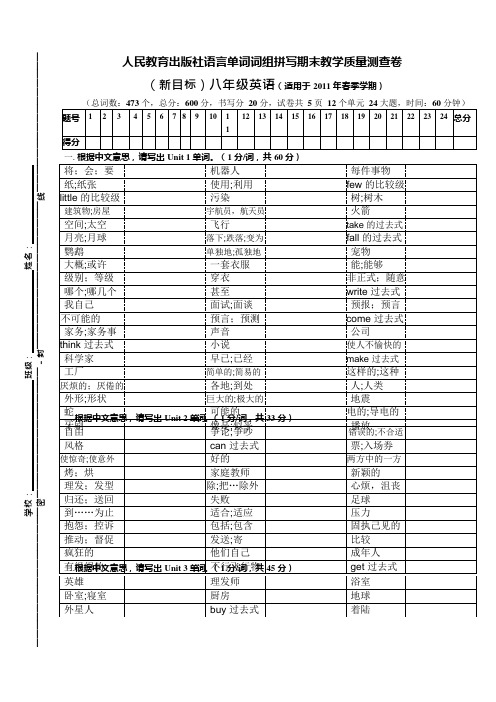
ride过去式
run过去式
任何地方
meet过去式
发生
事故
飞机
hear过去式
现代的
杀死;致死
谋杀;凶杀
明亮,发亮
运动场
ring过去式
tell过去式
关闭
寂静;沉静
最近的;近来的
破坏;毁坏
恐怖分子
意思;含义
become过去
航班,班机
钟;铃;门铃
四.根据中文意思,请写出Unit4单词。(1分/词,共36分)
十五.根据中文意思,请写出Unit3词组。(2分/词,共24分)
十六.根据中文意思,请写出Unit4词组。(2分/词,共32分)
十七.根据中文意思,请写出Unit5词组。(2分/词,共14分)
教育出版社语言单词词组拼写测试卷 八年级上册 英语 新目标 第4页 共5页
人
密
封
线
一直
十八.根据中文意思,请写出Review of units1-5词组。(2分/词,共8分)
相当;十分
确实的
院子
八.根据中文意思,请写出Unit7单词。(1分/词,共33分)
九.根据中文意思,请写出Unit8单词。(1分/词,共48分)
十.根据中文意思,请写出Unit9单词。(1分/词,共42分)
人民教育出版社语言单词词组拼写测试卷 八年级下册 英语 新目标 第3页 共5页
温度
赤道
无论如何
五.根据中文意思,请写出Uni据中文意思,请写出Reviewofunits1-5单词。(1分/词,共3分) 七.根据中文意思,请写出Unit6单词。(1分/词,共39分)
人民教育出版社语言单词词组拼写测试卷 八年级下册 英语 新目标 第2页 共5页
(完整版)四大时态综合练习(可编辑修改word版)
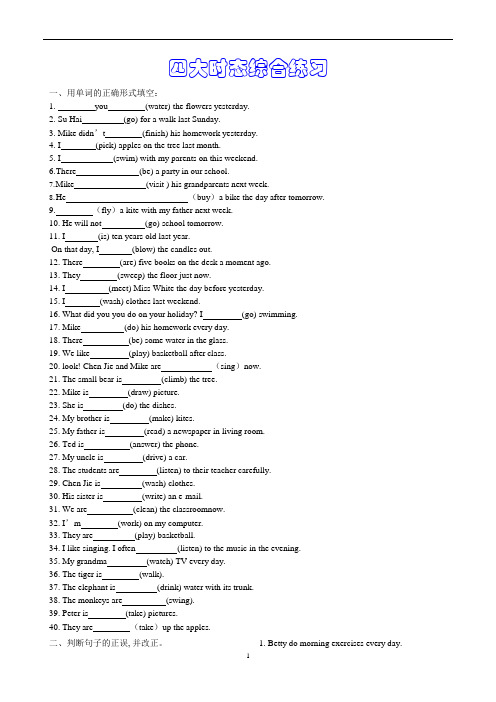
四大时态综合练习一、用单词的正确形式填空:1.you (water) the flowers yesterday.2.Su Hai (go) for a walk last Sunday.3.Mike didn’t (finish) his homework yesterday.4.I (pick) apples on the tree last month.5.I (swim) with my parents on this weekend.6.There (be) a party in our school.7.M ike (visit ) his grandparents next week.8.H e (buy)a bike the day after tomorrow.9. (fly)a kite with my father next week.10.He will not (go) school tomorrow.11.I (is) ten years old last year.On that day, I (blow) the candles out.12.There (are) five books on the desk a moment ago.13.They (sweep) the floor just now.14.I (meet) Miss White the day before yesterday.15.I (wash) clothes last weekend.16.What did you you do on your holiday? I (go) swimming.17.Mike (do) his homework every day.18.There (be) some water in the glass.19.We like (play) basketball after class.20.look! Chen Jie and Mike are (sing)now.21.The small bear is (climb) the tree.22.Mike is (draw) picture.23.She is (do) the dishes.24.My brother is (make) kites.25.My father is (read) a newspaper in living room.26.Ted is (answer) the phone.27.My uncle is (drive) a car.28.The students are (listen) to their teacher carefully.29.Chen Jie is (wash) clothes.30.His sister is (write) an e-mail.31.We are (clean) the classroomnow.32.I’m (work) on my computer.33.They are (play) basketball.34.I like singing. I often (listen) to the music in the evening.35.My grandma (watch) TV every day.36.The tiger is (walk).37.The elephant is (drink) water with its trunk.38.The monkeys are (swing).39.Peter is (take) pictures.40.They are (take)up the apples.二、判断句子的正误, 并改正。
(word完整版)初二英语用所给词的适当形式填空全解及练习(附答案)

用所给词的适当形式填空(初中英语)一、单复数(偶尔会考,但是错的概率还蛮高的,因为看起来简单,其实更容易忘记。
)1、名词单复数I like bananas (banana) very much. That is an apple (apple).2、be动词单复数(这里要注意过去时,不要忘记看后面的时态)There is (be) a pair of shoes under the bed. Here is (be) some water for you.I am (be) very glad to see you. Tom and I are (be) in the same class.Where were (be) you just now? I was (be) in the playground.3、代词单复数These(this) are rulers. Liu Tao is doing his(their) homework.二、名词所有格(这种题型的更容易错,我的学生就经常错在这个题型上,不是不会做,而是要忘记。
)This is Helen’s (Helen) scarf. Happy Children’s(children) Day.三、人称代词和物主代词1.人称代词—主格(在句中作主语,陈述句中一般在开头,一般疑问句中一般是第二个单词……) We(our) milked cows on the farm yesterday. Does she(her) have a new bike?Which pen do you(your) like? On Christmas Day I(my) got many presents. 2.人称代词—宾格(在句中作宾语,一般用在动词或介词后)Let me(mine) have a look. David is behind her(she).3.物主代词—形容词性(用在名词前)What is your(you) job? Miss Li is their(them) English teacher.4.物主代词—名词性(相当于“形容词性物主代词+名词”)The teapot is his(he). Yours(your) is over there.四、基数词和序数词1.基数词表示数量There are five(fifth) birds in the tree.2.序数词表示顺序March is the third(three) month in a year.常见序数词first second third (不要拼错了,学作文时也可以用)五、动词—时态(时态也是一个非常重要的一点,一定要在考试时注意。
- 1、下载文档前请自行甄别文档内容的完整性,平台不提供额外的编辑、内容补充、找答案等附加服务。
- 2、"仅部分预览"的文档,不可在线预览部分如存在完整性等问题,可反馈申请退款(可完整预览的文档不适用该条件!)。
- 3、如文档侵犯您的权益,请联系客服反馈,我们会尽快为您处理(人工客服工作时间:9:00-18:30)。
初中单词拼写做题技巧归纳练习Learning aims:1.了解单词拼写&句子翻译的出题类型及考点。
2.针对各类考点的查考技巧及注意事项。
【词汇题型】在学习英语过程中,除熟记单词、强化单词拼写题的训练外,掌握其应试的方法和技巧也是很重要的。
下面结合考试题型,谈谈单词拼写题的解题技巧。
【知识点一】考查词形变化和语法知识的运用能力1.Nearly two years has (过去) since she went there.2.Who is a bit (胖), Tom or Jack?3.The girl sings French songs very (好).4.Can you answer the (第二个) question in Russian?5.Two more bridges will be (建造) across the Changjiang River soon.6.Jack liked the two beautiful dictionaries very much, but he (买) neither. They were both too expensive for him.7.It will be (多云的) tomorrow, won’t it?8.In autumn the ground is often covered with fallen (树叶) after a strong wind.9.Helen preferred singing to (跳舞).10.The shop sells (妇女) handbags.点拨:这类词的考查,要求同学们根据句意、语法知识,分析要用什么形式。
其解题步骤为:第一,首先,要认真阅读全句,正确理解句意。
虽然题中有可能已给出应填词的汉语意义, 但英语与汉语并不是永远能一一对等的,因此正确理解全句有利于准确判断应填什么词。
第二,要分析应填词充当的句子成分,正确判断应填词的词性。
第三,要判断所填词应采用的正确词形。
若为名词,应注意:其单复数、可数还是不可数及其所有格形式;若为动词,应注意人称、数、时态、语态及非谓语动词形式;若为修饰语,应注意修饰名词或代词时用形容词,而修饰动词、形容词、副词或全句时要用副词;若为代词, 注意代词的各种形式;若为形容词、副词,应注意等级变化。
【知识点二】考查单词的拼写能力1.The little boy had so many strange questions that his teacher couldn’t u him.2.There are thirty-one days in D .3.People use (现代的) machines to do much work.4.Everything is (安静) and still at night.点拨:这类题所考查的词一般较长,无词形变化,主要考查同学们的记忆和拼写能力。
【知识点三】考查近义词语的辨异与英汉语言之间的区别5.How long may I (借) the magazine?6.The boy drew a very nice picture (用)his pencil.7.How long did it (花费) the workers to build the bridge?8.The soldiers went (穿过) the forest and reached the small village at last.9.He hasn’t been to the Great Wall. I haven’t,(也).点拨:同样意思的词有时会有多个,而到底哪个最切题意、最符合英语习惯呢?一是需要同学们平时掌握好近义词语的用法和英汉两种语言的差异;二是要从句子结构入手判断该词在句中的作用。
【知识点四】考查根据有关常识确定单词的能力10.S 10th is Chinese Teachers’ Day.11.C is spoken by the largest number of people in the world.12.People in England use Mr., Mrs. or Miss with the f name.13.Australia is the largest i country in the world.14.December 25 is C Day.15.There are twenty-eight or twenty-nine days in F .点拨:这类题目要求同学们不要读死书,要注意积累课外知识。
总之在解答这类题目时,要注意:词义、词形、词辨,还要正确、工整地拼写出单词。
不要因为书写时字迹潦草或不规范而丢分。
【习题精讲】1.通读全句,确定意思通读全句,根据前后内容判断该词意思,确保所填单词在逻辑意义上与整个句子一致。
例如:(1)Germany and France are E countries.分析:德国和法国都是欧洲国家,所缺单词修饰名词countries,故填European.(2)A good makes a good ending.分析:根据对应关系,应该是好的开始创造好的结局。
故填beginning.2.根据成分或结构,判断词性根据所拼单词在句中作的成分判断其词性。
例如:(1)He is a writer of rich (想象)。
分析:由句子结构可知,所缺单词被rich 修饰,作介词of 的宾语,应为名词,再结合词义,故填imagination.(2)Darwin based his ideas on (科学)experiment.分析:“科学”放在名词experiment 之前,修饰名词,应用形容词形式scientific.(3)Our teacher has (组织)a class trip to the Great Wall.分析:根据“组织”在句子结构中的功能,可知应用动词的过去分词形式organized.3.上下兼顾,判断单复数通读全句,根据上下意思判断名词的单复数。
例如:(1)The earth is one of the p .分析:前面有one of 结构,因此后面必须用复数形式planets.(2)(电脑)can do all kinds of things now.分析:因名词前无冠词,而且该名词是可数名词,故用复数形式computers.4.全面考虑,不忘大小写(1)(秋天)comes after summer.分析:句首的单词首写字母必须大写,又根据常识可知填Autumn.(2)Some American children posted some (圣诞)cards to us.分析:“圣诞”为专有名词,首字母必须大写,故填Christmas说了常见题型&做题方法,我们再根据这学期所学的知识来归纳各种类型的题目,专项练习。
【经典习题】1、考察名词类题型1.Our living (条件)are getting better and better now.2.It's important for us to protect our (环境)in a right way.3.-Have you met her since 2012?-No. But we keep in with each other by talking on the phone.4.When we write about a thing, we can put our ideas into five main (要点).5.The wind is blowing strongly with lots of (沙).6.The hole is full of dead (老鼠)and smells terrible.7.Details decide (成功)or not.If we take everything seriously,we’ll achieve our goals(达到目标)8.Don't feed the two babies any more. Look at their (胃).9.The book sells well. We have sold out millions of (份)already.10.He put one of his (手指)into his mouth to show that he needed food.二、考察动词类题型1.She's (意识到)she is wrong at this matter, so she feels very sorry.2.The Green family will (返回)from England next weekend.3. (improve) your DIY skill, you'd better practise from time to time.4.How many times the teacher (communicate) with the parents in the past two months?5.-May I use your dictionary? -Sorry, I (use) it now.6.I (感觉到)the ground was moving and then someone was shouting,“Earthquake!”7.S he (嫁)a rich man, but she was not happy as before.8.My sister couldn't stop (laugh) when I made faces.9.The whole class except Zhang Fei (get) on the bus already. Where is he?10.After she entered the cinema, she (hurry) to find her seat as the film was on11.- you (finish) reading the book?-Not yet. I will finish it soon.12.They spent the weekend13.Look! Jim seems unhappy. What (practice) playing the piano.(happen) to him?14. What's the best gift Joe has ever 15. -Did you see your brother go out? -No, I (收到)for her birthday?(watch) a football match.16. Doing sports every day (help) us keep fit.17. Up to now, we (receive) many calls complaining about this expensive shop.18.Xiao Li promised(承诺)to chat with me on the Internet ,but so far he (not do)so .19. I don't know if she (accept) my offer tomorrow.20. I can't find my pen. I wonder who (take) it away.三、考察形容词/副词的题型1. We have little time. It's (不可能)to finish the project in such a short time.2. The price of almost everything has gone up quickly (最近).3.We watched a (极好的)play yesterday evening and enjoyed ourselves.4.There is no (这样的)thing as a free lunch in the w.rld, so don'tdaydream . 5.We are planning to have Sichuan food for dinner. It is (美味的).6. Times were (艰苦的)after World War Ⅱand many people died.7.What a terrible painting! This is the (ugly)painting I’ve everseen . 8.Anna had a fever yesterday ,so she was (able)to go toschool .9. Life in a busy city is wonderful.(然而), the traffic and noise make youuncomfortable.四、综合类题型1. -Do you play chess as often as ? -We stopped doing that after he moved away.2. -Has she been alone all her ? -Yes. As others say, she married herself.3. While Tom with his parents (sweep) the floor yesterday, the telephone rang.4. It's the third time you (be) late for school this week. Please come to school early next time.5. I'm sure the more careful you are, the fewer mistakes you (make) next time.6.-Will you go to the to meet Lucy?-Yes. I want her to see me as soon as she gets off the plane.7.-People tell me that you will go to Hongkong this Sunday. Can you bring me some face cream?-Sorry, I go there on , not for travelling.I will be busy with my work.,8. - Which kind of colour do you like?-Dark ones, as black, grey and brown.10. There (be) little rain in Wuxi in three days, is there?11. -Have you ever been to any countries?-Yes. Last year I went to France and England. But I think I like Asian and American countries better.12. -I can't see anything on my computer now. What has happened?-The main unit is OK. So there must be something wrong with the .13. -Thank you so much for caring for my baby while I am away. -My .14. I (book) two tickets if you fly to Shanghai with me tomorrow.15. There are some tips about how (relax) yourselves if you feel too tired.16. -What is the word of heavy, Dylan? -Light.17. -What does your mother do?-She is a . She has written five books since last year.18. -Why did you his invitation to the party? -I didn't accept it because I didn't have time.19.-Would you mind (lift) the heavy bag for me, young man?-Never mind.20.The farmer couldn't decide which tree (tie) his donkey to.。
